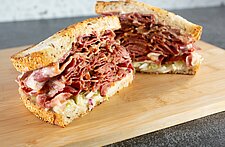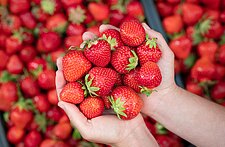Recently Symrise sat down with Ramin Ganeshram to discuss what the future of meals might look like. Ramin Ganeshram is a veteran journalist who holds a master’s degree in journalism from Columbia University. For eight years she worked as a feature writer/stringer for the New York Times and another eight years for Newsday as a feature writer and food columnist. She has been awarded seven Society of Professional Journalist awards and an International Association of Culinary Professionals (IACP) cookbook award for her work and has been a finalist for the IACP Bert Greene Award for Culinary Journalism.
Symrise: How will the meal of the future look, both in food service and retail?
Ramin Ganeshram: All signs have been pointing to a vegetarian/vegan heavy diet as time passes. I believe in ten years’ our diet will look more like the Mediterranean diet and the “Blue Zone” type of eating with minimal animal protein and a larger plant-basis. This means that on-the-go meals will have to be more creative , particularly when it comes to “preserved” meals (frozen, shelf stable etc.) The good news is that plant based meals to go will require less refrigeration and that will make them far more portable. But, as this evolution continues, packaging that speaks to the fresh, highly sustainable plant-based diet will be more in demand—particularly in high volume food service take away. You’ll also see more creative packaging like bowls-to-go (like Pret A Manger’s Power Lunch to go bowls are a good example) or self-contained hot-cold preserving packaging which will be useful in retail.

Symrise: How will Millennials be eating and consuming meals 10 years down the road?
Ramin: In ten years, most Millennials will have entered the life stage of either being parents or being established in their careers, if not both. Their core values as a cohort—experience, experimentation and adventure among them—won’t have gone away but have adapted to the life stage they are in. (We already saw this with Gen Xers who indulged their cynical values by demanding food safety through organics) To me this means they will be looking for on-the –go meals that fit these values of taste experience and experimentation for themselves and their families that are undiluted. More and more they seek culturally authentic foods that are portable by nature like bao (Chinese steamed buns, Tamales, and Caribbean patties. Because of their desire to be part of the process, I believe you’ll see more desire for food techniques (perhaps kits) that allow them to make food now for later portability—in other words, that allows them to put the time in when they can to create “take away” food for later.
Symrise: What consumption patterns will we see?
Ramin: Over the last years we’ve seen the blending of day parts, in a way that fit more closely with Millennials lifestyles that, thanks to economy and technology factors, are not necessarily based on “traditional” norms. I believe you’ll see these patterns become even more individualistic based on “feel good” criteria. In other words, there will be those who have learned that proteins as a first meal work for them while others eat only one meal a day. The point is, just as ethnic-identity and gender roles are highly individual considerations, in the future, eating styles and consumption patterns will become highly individual. The larger movement will be about the rights of eaters to eat in a personalized way.
CLICK HERE to view Kids In the Kitchen by Ramin Ganeshram
Symrise: How will blending of day-parts and eating occasions track over time?
Ramin: Day part blending isn’t going away, but what will change is any reference to it as a “blend” at all. What will go away is the categorization of day parts at all. This is important for food service particularly because successful eateries will have to create all day, any food menus. To make this work menus will have to be smaller, executable at any time, but still be fresh and healthy. Multiple portion sizing like what is traditional in beverage (small, medium, and large) will be also be in demand—so the same item could be a mini-meal for one person or up-sized into a full meal for another.
Symrise: What do you think will happen in regards to customization (both in retail and on menus)?
Ramin: Food service and food retailers will have to think about foods as components and allow the consumer of the future to exercise their right to individuality in their eating. These components won’t fit into traditional day parts so food categorization (breakfast food, lunch food etc.) will go away. Instead food will be more critically assessed by flavor, mouth feel, and portability in order for components to mix and match well. Early success stories with this can be seen in salad concepts (build your own) and build your own burger bars (like Bareburger). Already, some supermarket retailers are “bundling” groceraunt offerings (Whole Foods’ Indian hot bar is a great example) and bundling whole ingredients by recipe, particularly in produce aisle, but I believe you’ll see far more of this.

Symrise: What is the store of tomorrow and how will meals factor in?
Ramin: Just as food preferences and diet styles have not only become the expected norm, but are being catered to by CPG companies (vegan, gluten-free, paleo etc) I believe that in the future there will be an abundance of small markets that specialize in a diet choice or food lifestyle. These stores will give greater space to in-store prepared food that also follow the store’s theme, both for eat-in and take out. A great example is Nuggets markets in California which recently designated 14 different diet “lifestyles” for its customers and has categorized all items in the store with a lifestyle tag for easier shopping.
CLICK HERE to view Millennial Snacking Trends: The Mini Meal
Look for traditional retailers to also create more spin offs that allow them to tap into the desire for “fresh” and “natural” concepts or some other diet lifestyle. An extremely early entry into this market was Wild By Nature, the organic concept of New York’s King Kullen stores. Stop N Shop (Martins Foods) now has B. Fresh, and Kroger’s has just announced Main & Vine where cooking demos and tastings are an important part of the “experience” that allows consumers to “test run” meals before they buy the finished product or the ingredients to make it themselves.
Symrise: What's your view on cost and convenience vs. health and premiumization?
Ramin: Increasingly consumers are seeing health and premiumization as based in simplicity. In other words, simple, fresh ingredients are both healthy and they feel high-end because every ingredient counts—and so must be the best it can be. This is important since simple recipes—both to make at home, or buy in retail—require fewer ingredients they are more convenient to buy and make. Plus, the finished product is and is more recognizable. This recognizability feels safe and clean—clean food is the new premium, particularly for younger consumers—NPD group recently released a study that said “Fresh, limited processing and natural are desired characteristics particularly among Millennials.”
Symrise: What will happen with flavor exploration in relation to meals?
Ramin: I think this goes back to the idea of individuality as a standard in eating preference and behavior. As consumers indulge more and more in this behavior, seeking component eating opportunities, they have greater opportunity to control the flavor intensity of their foods. As in the past, I believe you’ll see condiments play a strong role. Following the pattern of the last five years, I believe those condiments will span the globe and be categorized for the intensity of the flavor experience (meaty, salty, spicy, fishy, etc.) rather than the ingredient or ethnic style. When it comes to frozen foods and packaged snacks there will be a greater demand for world flavors as a foundational norm. Indian, Caribbean, and South American cuisine items will enter in a standard rotation along with European specialties for age-old brands.
Fore more information on the "Future of Meals" from Symrise, submit your questions/comments by clicking HERE





